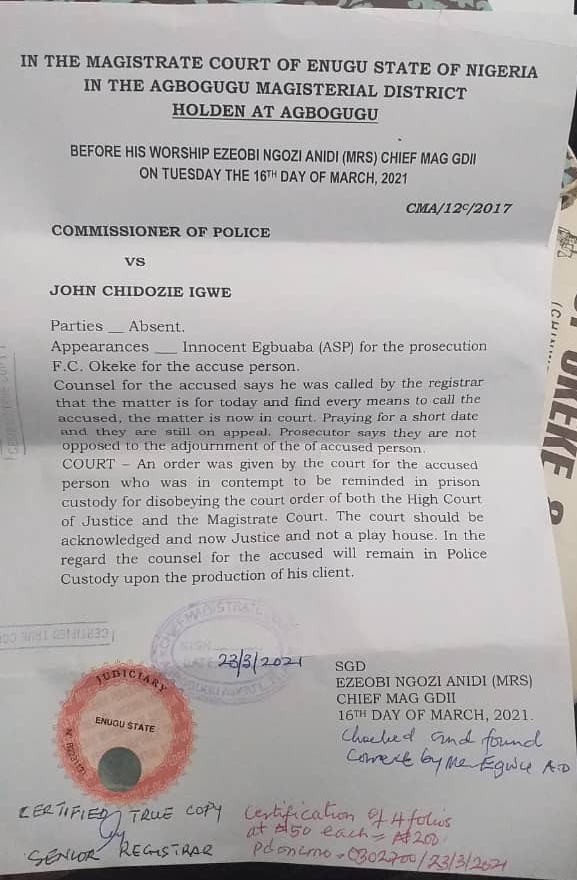ENUGU RULING: DIALECTICS OF CTC, REMAND AND LAWYER’S FREEDOM, BY PROF. RACE ACHARA
In this article, leading jurist and former Dean of Law, PROF. R. A. C. E. ACHARA tackles the claim that the certified copy of a trending ruling of an Agbogugu Magistrates Court presided over by His Worship, Ezeobi Ngozi Anidi (Mrs) which allegedly ordered a remand of one F. C. Okeke Esq, is fake and proffers a synthesis
The beauty of law often consists in its long established rules for testing between opposed versions of a story.
Currently, there is a CTC of the court’s proceedings. A CTC is by our Evidence Act the equivalent of the manuscript record of the presiding magistrate. If it has been forged by the court’s registrar, we should all be alarmed and the felon should be prosecuted and dismissed from service. What was published is not an enrolled order where perhaps the registrar might, in the inevitable attempt at summarization, have lost the meaning intended by the adjudicator. But even here, the hoary legal principles provide an important safeguard. If it is an enrolled order drafted by the court’s clerk or registrar, the adjudicator himself must sign it. This affords such a magistrate the opportunity and duty to cross-check the draft. A CTC involves no summary. It is a direct capture ipsissima verba of the record made by the adjudicator on the record book. This is why there’s no legal necessity for the judge to sign it, having already signed the original record book from which it has been extracted by her own staff.
So, which of the two conflicting stories would lawyers accept under our age-old laws and practice procedures? The record book (extracted by the court’s registrar, at a fee, and under the judicial seal of Enugu State by the usual Evidence Act procedure of a CTC)? Or, a social media publication by a random lawyer (with no legal practitioner’s stamp and seal, no claim of representation for the Hon. Chief Magistrate, or any apparent nexus or employment with the Enugu State judiciary)?
Nota bene:
The two narratives conflict only on the matter of whether or not the learned magistrate made the order suggesting, as shown in the CTC of her own records, that learned counsel should be remanded in police custody until such a time as his contemptuous client is found to replace him in gaol.
The grammatical ambiguity might be good reason for the police not to detain the lawyer, but that is a different conversation altogether.
Other than in this respect, the body of the new narrative does not conflict with the gist of the CTC. It talks of the conduct of the client, which if proven, could warrant his committal to prison for contempt. Apparently, the learned Chief Magistrate had already indeed committed him (ostensibly in absentia) to prison. It did not address the CTC evidence that as a result of the client’s assumed peccadilloes, the Hon. Chief Magistrate turned her ire on the client’s counsel. Indeed, the narrative tends to buttress this.
This is no instance to throw the safety of fellow counsel to the dogs merely for representation of their clients in court. Unless taken to its legal limits, the precedent would be dangerous and only encourage any out of control adjudicator to gamble on an abusive, infra dignitatem imprisonment of a legal practitioner, in the malicious understanding that before its reversal, the humiliated fellow lawyer would have unjustly, even if for a few hours, been incarcerated in shame.
Chief Theodore Ezeobi, SAN, God rest his soul, would never tolerate this sort of humiliation. His name need not be dragged into this fiasco.
 Copyright 2020 CITY LAWYER. Please send emails to citylawyermag@gmail.com. Join us on Facebook at https://web.facebook.com/City-Lawyer-Magazine-434937936684320 and on TWITTER at https://twitter.com/CityLawyerMag. To ADVERTISE in CITY LAWYER, please email citylawyermag@gmail.com or call 08138380083. All materials available on this Website are protected by copyright, trade mark and other proprietary and intellectual property laws. You may not use any of our intellectual property rights without our express written consent or attribution to www.citylawyermag.com. However, you are permitted to print or save to your individual PC, tablet or storage extracts from this Website for your own personal non-commercial use.
Copyright 2020 CITY LAWYER. Please send emails to citylawyermag@gmail.com. Join us on Facebook at https://web.facebook.com/City-Lawyer-Magazine-434937936684320 and on TWITTER at https://twitter.com/CityLawyerMag. To ADVERTISE in CITY LAWYER, please email citylawyermag@gmail.com or call 08138380083. All materials available on this Website are protected by copyright, trade mark and other proprietary and intellectual property laws. You may not use any of our intellectual property rights without our express written consent or attribution to www.citylawyermag.com. However, you are permitted to print or save to your individual PC, tablet or storage extracts from this Website for your own personal non-commercial use.
